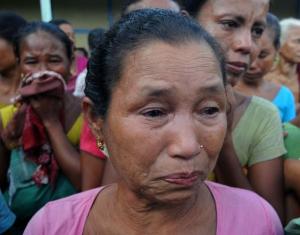Snigdha Guha Roy (GNLU)
Time will bring to life whatever is hidden; it will cover up and conceal whatever is now shining in splendor. The situation in Assam seemed to have cropped up out of nowhere but we know better, don’t we? Even with the whole state burning, Mr. Tarun Gogoi, who is currently serving his third consecutive tenure as the Chief Minister of Assam thrice consecutively, prefers to live in denial of the enormity of the situation. He seems oblivious of the fact that people around the world have now seen through the façade, of peace and harmony in the State maintained by him.
The Bodos and the Muslims of the region have shared a long history of animosity. However the complexity of the situation in Assam and the underlying grey area make it difficult to categorize any one of them as the aggressor or the victim. Since the time the reporting has become more exhaustive and the real tragedy has unfolded through the terrified faces of many thousands in the relief camps, it has become apparent that this is no one-sided riot: Bodos, Bengali Hindus, Adivasis and Muslims have all suffered in the melting pot of a diverse, multi-ethnic society.[1] Nevertheless in the present scenario the ‘Bangladeshi immigrants’ have been tagged as the reason for all the atrocities. However, one wonders whether that is the only reason.
The problem of immigration has been looming over the state for a long a time now. The predicament of it has been highlighted by many even before the actual consequence surfaced, yet the successive governments in Assam and the Centre have turned a blind eye towards the impending end in order to play vote bank politics. In 1998, the then Governor of Assam, Gen. SK Sinha had extensively spoken about the infiltration problems in his report to the President of India. Warning about the disastrous consequences he had stated that “the unabated influx of illegal migrants from Bangladesh into Assam and the consequent perceptible change in the demographic pattern of the State has been a matter of grave concern. It threatens to reduce the Assamese people to a minority in their own state.”
The consequence of immigration is not only an increase in demand on the natural resources of the land but also an amplified competition for survival. So is also the situation in Assam. According to many the clash in Assam is a backlash of people fighting for their socio-economic and cultural survival in their own homeland. The continuous snatching away of land, employment and economic opportunity are the root causes.
These consequences of immigration make one wonder whether the real problem is infiltration by Bangladeshi Muslims or the increase in population. The Bangladeshi migrants who had come as refugees initially had struggled to make a living and gradually started competing for land and resource with villages in hinterland which led to the violent clashes with natives.[2] But the migration to Assam had started since the beginning of the 20th century where the people from the now West Bengal were persuaded to move to Assam. Those migrants included both Hindus and Muslims. So, given the situation where does the question of ethnicity of the people involved in the struggle arise?
Another possible reason of the violence is the aspiration of the native Bodos to have their very own Bodoland free from the presence of any non – Bodo actors. In this situation also, it is not them versus the Hindus but them versus anyone and everyone taking away their fair share of the State.
Amidst all the violence in the State, one cannot overlook the failure of the State to act. The State of Assam has failed miserably in its responsibility to maintain peace and order in the State. There are various reports which suggest that despite the Government and the police knowing about the unrest in the State, there was lack of active participation from their side. . In such situations, the State is required to be proactive rather than reactive. On 6th September 2012, the National Committee for Minorities (NCM) held the police and the other state machinery responsible for the violence and unrest in the state. Wajahat Habibullah, chairperson, NCM who had recently toured the violence hit state said that the main concern of the government and authorities should be speedy and just rehabilitation of the people. “It is to be done in such a manner that people go back to their places”. Mr. Tarun Gogoi had committed to rehabilitating the affected people living in the migration camps by 15thof August 2012. However, nothing much has been done till date. The thousands of people, living in the camps, who lost their homes in this struggle are living in conditions unfathomable. With no source of income and nowhere to return they seem to be at the complete disposal of the government. No matter whether this is an attack on a particular ethic group or a backlash of the long suppression, it is the innocent people who are feeling the brunt of the violence.



